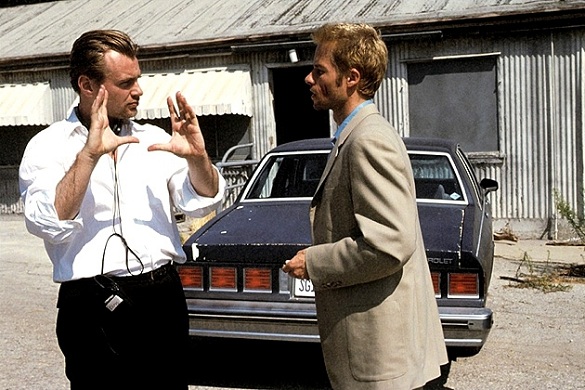Alex writes about what makes us all collectively understand and enjoy the work of Christopher Nolan.
“Murphy’s law doesn’t mean that something bad will happen. It means that whatever can happen, will happen.”
I have spent a lot of time thinking about this quote over the past few months, for reasons only kind of related to my profound level of interest in the movie it is pulled from. Something about the line sticks, because something about the way Christopher Nolan makes films sticks with people like myself. The line itself reads as overly simplistic on paper, but when Matthew McConaughey mumbles it, it somehow becomes the only thing I want to think about. The line is a conscious separation, a move away from the most common perception of a concept that we all understand, but that separation never makes such a large leap that we can’t immediately follow what has changed about it. It’s broad, but it’s likely that broadness that allows Nolan to temporarily become the zeitgeist every two years.
Christopher Nolan is very, very good at making films. Yes, art is subjective and all that other bullshit I say in conversations to try to not sound like an elitist, but this is as close to an inarguable fact that exists in Hollywood. If you didn’t like The Dark Knight, you probably still liked The Prestige, because people who can’t deal with superhero movies enjoy magician movies that are actually secret analyses of the modern media environment. Memento is probably one of the best ten American movies of the new millennium, and one that will not get any less interesting as the years continue to pass. Inception is about as good as big budget filmmaking has the capacity to be. These are all films that I love, and films that I have seen a gratuitous amount of times. I love them, and I have no trouble explaining why when asked, but it seems odd to me that most people feel the same way. Rarely do my tastes align perfectly with that of the crowd’s. I think Nolan’s films are often fascinating and worth thinking about after they end, and they are executed in such a manner that their core ideas are rarely obfuscated by something as boring as an action sequence, but a good execution of good ideas does not necessarily mean a film catches on with the public. If it did, Whiplash would be this year’s biggest box office smash. So there must be something in Nolan’s head that is the secret to blockbuster filmmaking, something the rest of the filmmaking community simply doesn’t have access to (or perhaps chooses to avoid).
Admittedly, not all of Nolan’s movies have been as popular as those featuring Batman, because nothing in cinema is currently more popular than a rich person in a costume. Memento was only a very specific kind of hit, and despite its financial success, nobody ever cared all that much about Insomnia. The Prestige stars Batman and Wolverine, but did not do Batman nor Wolverine numbers. Yet every post-Memento Nolan film has made over $100 million dollars at the box office, and has been equivalently well-reviewed. One can debate which of his films is actually his best, or whether any of them are actually great films, but the popular and critical opinion is always exuberant. He doesn’t seem to leave people non-plussed.
There are obvious reasons for why Nolan is able to succeed at such a thing, I suppose. He makes more thoughtful versions of dumb things. In his round of recent Interstellar interviews, he has been talking about how he almost feels a sort of responsibility to make his films as big as he can, and sometimes the trickier aspects of his earlier films have to fall by the wayside as a result. More than anything, Nolan wants audiences to be wowed, and this is why he tries to make each of his movies bigger than the last. This tendency leads Steven Soderbergh, who helped Nolan in the door at Warner Brothers, to believe that Nolan will never make a film as small as Memento or The Prestige again. Like all wistfully nostalgic film-lovers, Nolan recalls the feeling of sharing an experience with a room full of strangers, and that’s what he wants to give people each time he convinces somebody to give him $200 million dollars to play with.
In a recent New York Times profile, writer Gideon Lewis-Kraus recounts Nolan talking about what brought him to his love of cinema, and points to a time in his youth when Nolan saw Star Wars and a re-release of 2001: A Space Odyssey within the span of a year. Whether this is being brought up as Nolan’s Interstellar advertising talking point or not, the linking of these films is likely perfect. Both films take place in space. Both films are well made. Both films are entertaining. But each of those films is interesting in its own way: Star Wars was an engaging, linear narrative about a boy growing up to become a savior, made up of all the most crowd-pleasing moments possible. 2001: A Space Odyssey was about a journey into space, but it could also be about four million other things, depending on your perception of Joel McHale lookalike Keir Dullea’s final scene. Put these two films together and you have everything that’s present in Nolan’s career: simultaneous satisfaction and mystification.
In the way Nolan tells his stories, he frequently splits his narratives in two strands (at least), so that he has a way to intercut the narrative in a way that keeps the viewer guessing as to where they really are within the story. Even with Memento, one of his smallest scale films, the story film is built around forward-moving narration scenes and backward-moving details, until they meet in the middle and Joey Pants and Jimmy Grants get shot in the face. Nolan’s Batman films have climaxes that each get progressively more complex as the series continues; in Batman Begins, we get Batman fighting separately from Rachel Dawes and Gordon. By The Dark Knight Rises, there are those kids on the bus, Batman punching Bane, people hiding a nuke, Catwoman freeing cops, and then probably also four other things I forgot amidst the anarchistic chaos. Inception does this too: with its dreamscape’s various levels, we see characters threatened by a gunfight in reality while also trying to incept Cillian Murphy so he accepts a role in Peaky Blinders. As one action sequence is resolved, it’s satisfying, but the fact that there are still two others for the characters to get out of compounds that satisfaction. Nolan lays so many various narrative threads that when they all get tied up, one after another, they form a storytelling climax to pair with the more physical one happening on a mountain in Alberta. He makes complex things seem surprisingly simple; this is why Memento can be enjoyed on one viewing despite the fact that it is borderline impossible to keep track of everything that actually happens. The world of Inception is illogical and complicated, but nobody really had all that much trouble remembering where they were, and if they did, they still understood that they cared about what happened in the final shot. The key events are shown in a way that we remember and follow them, because Nolan knows how to make sure we all see the most important things in his films.
There are plenty of people that don’t get the fuss about Nolan’s work. I have written many emails trying to convince these people, and all of these communiqués have been failures. These are people that want their Batman films to conclude with Alfred and Bruce talking for forty minutes about the repercussions of vigilantism, as opposed to the punching-based finales present in the films that actually exist. I understand this impulse; I would probably love that film too. But Nolan films are designed to give you an experience first, with something to think about later, and sometimes the former causes the latter to take a hit. I assume Nolan knows exactly what he’s sacrificing in order to make more people like his work. For people that have a long-standing love of blockbuster cinema, Nolan films are still the best execution of a type of film we love. There will always be people that simply don’t like that type of film, and similarly do not understand why I lose my fucking mind over Nolan’s work. Nolan holds back more than most blockbuster directors, but it’s still not enough for people that don’t like the broadness of blockbusters to begin with. Even within this, however, Nolan detractors will like The Prestige and Memento because there are fewer answers in those films, and more for the audience to parse out for themselves; Nolan leaned toward the mystify side of things a bit more on those ones.
Aside from his obvious stylistic talent, and his flair for building labyrinthine narratives, there is one thing that Christopher Nolan does better than anybody: he ends his movies perfectly. Better than any modern director, he understands the importance of finality. He knows the power of Jimmy Stewart looking over the ledge, having finally conquered his vertigo, to see a new, much bigger problem below. Hitchcock wanted that to be the thing we left the movie thinking about, so it was the last thing he showed us. And that’s what Nolan does pretty much every time he ends a film.
He has admittedly gotten better at this with time. Memento has one of his better final lines, but the execution isn’t as sharp as it would come to be in the following decade. He didn’t yet understand that his movies don’t lend themselves to David Bowie end credit songs. I don’t entirely remember how Insomnia ends, but everybody forgets Nolan directed that movie anyway, so perhaps that’s appropriate. By the time Nolan hit Batman Begins, he knew what he was doing, and he had the skill to execute his ideas. For his movie about overcoming one’s fears, he wanted to end it by showing his lead character being confident in what he had overcome, and wholly unphased by the next fear that Lieutenant Gordon was introducing him to. Bruce Wayne had grown up, Batman had begun. And then the film cut to black, because the story was over. This is, more or less, how all of Nolan’s films end. Rarely is there an epilogue. Nolan saves his most important idea for the very end, because it is the idea he wants you to think about the most.
Nolan’s most famous ending is unquestionably Inception. It is either one of the most frustrating or satisfying conclusions to a film, depending on who you ask. I hardly need to explain the set-up of the scene; it is the most famous shot of a spinning top in the history of cinema. But what is important to note about the scene is the way the camera follows the top itself, as opposed to the character we have been trailing behind for the previous two-plus hours. Cobb hugs his children as the camera pans away from him, and dollies into a close-up of the top even before Cobb has a chance to find out whether or not he’s awake. As the film cuts to black without any definitive resolution about whether it will stay standing or fall over, audiences collectively awed, because Nolan quietly loves to fuck with your emotions. We wanted to know the answer to the last question that had been posed: is Cobb in reality? Is he awake? Of course, the point isn’t whether or not he is; it’s that Cobb was willing to leave behind the one thing he believes can tell him whether or not what he’s experiencing is authentic. The camera moves away from Dom because Dom moves away from the top. The point of Inception is that one shouldn’t care whether what they are experiencing is authentic, they should merely try to experience the thing that consistently makes them as happy as possible. We move away from Dom’s perspective only to show us that he is done caring about where that perspective is coming from. That viewers were so fixated on the top only further proved the conclusion’s point; it’s not that serious, just go hug your damn kids. The film audience stays with the top, because these questions are what make filmgoers happy, and it is what kept Inception as culturally significant as it was in the summer of 2010. This is Nolan’s talent: to tell a thoroughly engaging story that ends with an answer and a mystery that come out of the same question. Nolan wants to satisfy the people that are watching his movie, but he wants to keep them mystified enough to talk about it afterward.
I have no idea what to expect out of Interstellar, beyond the obvious. I suspect it will be predictably Malickian, and the burning cornfield scenes will be his equivalent of Days of Heaven’s locust attack. The characters will be types more than deeply explained people, because that is how Hitchcock inadvertently taught Nolan to paint his characters. Matthew McConaghey will be playing the personification of Midwestern American ideals, because that is what we all understand McConaughey to be now. This much we know. The rest of what we know has been told in the trailer, when Mr. Midwest explains to us that Murphy’s Law isn’t about whatever can go wrong will go wrong, but whatever can happen will happen. It’s an old, well-known idea, retold from a slightly different perspective, but one we immediately recognize. It is everything we collectively enjoy about Nolan’s films.
What Nolan does throughout his work is present us with ideas we all immediately understand: that of a man with no memory, magicians in competition with each other, or a lunatic in a weird mask fighting a lunatic in an even weirder mask. Nolan gives us broad characters that we can picture ourselves inhabiting without much of a reach. We never get too many details about why we aren’t like these people, just a repetition of the few points we need to know for the movie to be a success. Leonard Shelby is a person who loved his wife. Alfred Borden wanted to be the best at his profession. Batman missed his dead parents and wanted to finish the job his father started. Cobb just wants his kids back. The specifics never matter as much as the well-known totems that remind us where we are in the story.
It has been frequently reported over his career that, while in production on one of his own films, Nolan avoids watching movies entirely, a non-habit that is uncommon for directors. Typically when a director is describing the process of making their most recent film, they will explain which film they studied for inspiration while on set. Paul Thomas Anderson fell asleep to The Treasure of the Sierra Madre each night while making There Will Be Blood, and Rian Johnson watched Chinatown when he wrapped Brick for the day. These influences tend to be obvious when watching the films that end up being made with these visions of John Huston dancing in the directors’ heads. With Nolan, he tries to avoid direct influences. Like his characters, the influence is obvious and always broad, and there is a sort of in-between space of indeterminate references that his films seem to occupy, a space that always seems predictable only after you’ve already entered. It took me five years to realize that the shots of Leonard’s wife in Memento are Malick-inspired, but the second I discovered this it seemed profoundly obvious. Nolan has mentioned 2001: A Space Odyssey as an inspiration on Interstellar, but I don’t think for a second that specific shots will be imitated, monoliths repeated. Nolan’s films avoid specificity, which are why they get us all. He takes his years of love of film and storytelling, and makes the most pointed version of his story that he can. He doesn’t do many long, sweeping dolly shots, and his films’ camera work is sometimes frustratingly utilitarian because he likes to pick his spots for his more visually dramatic moments. Nolan takes the things that have combined within his memory to form this abstract version of popular film history, and he continues that each time he makes a film. And then, when his idea has run its course, he stops. The story is done, the dots connected, and whatever can happen will happen. We all know this, because it’s an idea so broad that it’s impossible to deny, an idea we all deem worth thinking about the second we understand it. It’s a feeling that’s impossible to describe, but always feels incredible. Few things are simultaneously challenging and easy to decipher, and regardless of how complex the details get, we should all be so fortunate to understand this fact. Luckily, it seems like we do.







